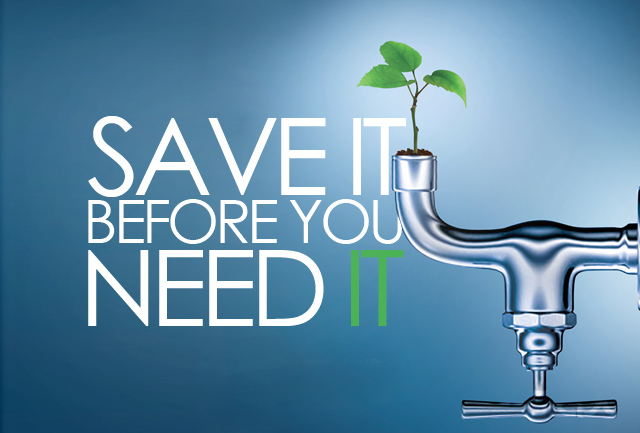Water is a key element for life on Earth. It plays an essential role in our health, economy, food production, industry, recreation and environment.
Water may seem abundant, but only 2% of the world’s water can actually be used for human needs!
Many countries in the world and some states in the U.S. are already facing great water scarcity problems and if population projections prove accurate (8 to 9 billion people by 2050 per the Population Reference Bureau) many regions of Earth will be facing even more significant water shortages within the next 50 years.
Northeastern University civil and environmental engineering associate professor Auroop Ganguly states that “Population rise will lead to a greater demand for water, and climate change will decrease global rainfall, increase evaporation, and lower supply.” These prognostics are alarming and a great incentive for us to increase our water conservation efforts.
Although many of us are fortunate not to live (for now) in areas with water shortages; it is our responsibility to safeguard this essential resource as much as we can. Many lives in the coming years depend on it!
Here are some easy ways you can save water (and money!) in your everyday lives:
Kitchen:
• Don’t let water run when washing dishes. Instead, fill one large basin with wash water, the other with rinse water.
• Dishwashers use less water than washing by hand. Look for the Energy Star sticker on your appliances since they use even less water and energy.
• Wash fruits and vegetables in a bowl of water rather than under running tap.
• When you are done rinsing your vegetables use the water to water your plants.
• Cook in the least amount of water possible. This also helps retain more nutrients.
• Use leftover water from cooked foods to make a very nutritious soup.
• Soak pots and pans instead of letting water run while you scrape them clean.
• Use the garbage disposal sparingly. Compost vegetable waste or throw it in the trash – this saves gallons of water.
• Don’t defrost foods or melt ice under running water.
Bathroom:
• Take shorter showers. If you keep them under 5 minutes you’ll save up to 1,000 gallons a month.
• Cutting your regular shower time by 1 or 2 minutes will save up to 150 gallons per month.
• To save up to 4 gallons a minute, turn off the water while brushing your teeth or shaving. A family of 4 can save 200 gallons per week.
• Throw your tissues in the trash instead of flushing them down the toilet.
• Check your faucets and shower heads for leaks. One drip per second could add up to 5 gallons per day.
• Collect running water while you wait for it to heat up. Use it to water your plants or wash veggies and fruits.
• Test your toilets for leaks at least once a year.
Yard:
• Run your sprinklers before 10 a.m. or after 4 p.m. – 65% of water applied mid-day evaporates.
• Water for one hour or less per zone, up to 3/4-inch: Set a timer and place shallow cans in your yard to monitor volume.
• Water only on your scheduled day.
• Check your sprinkler system frequently. Adjust sprinklers so only your lawn is watered and not the house, sidewalk or street.
• Install rain sensors that disable your irrigation system’s irrigation controller from operating during periods of wet weather.
• Install tree T-PEEs around your 1-5 year old trees. These water and nutrient containment systems save 75% of the water used to grow each tree. Makes them stronger and protects them from frost! http://treetpee.com/products
General tips:
• You can save up to 1,000 gallons if you only run your washer and dishwasher when they’re full.
• Reuse your towels whether in your house or in hotels.
• Watch your water bill and water meter closely as they could help you discover leaks.
• Turn off faucets tightly after each use and teach your family members to do the same.
• Install water-saving aerators on all your faucets.
Let’s all help in this mission to make the world a better place for our descendants!
These are a few easy-to-follow tips you can start using today! Even the smallest adjustments can have a big impact! For a 100 water conservation tips, visit http://wateruseitwisely.com/100-ways-to-conserve/?view=list
